新视野大学英语(第三版)读写教程第二册教案完整版
- 格式:docx
- 大小:107.58 KB
- 文档页数:62
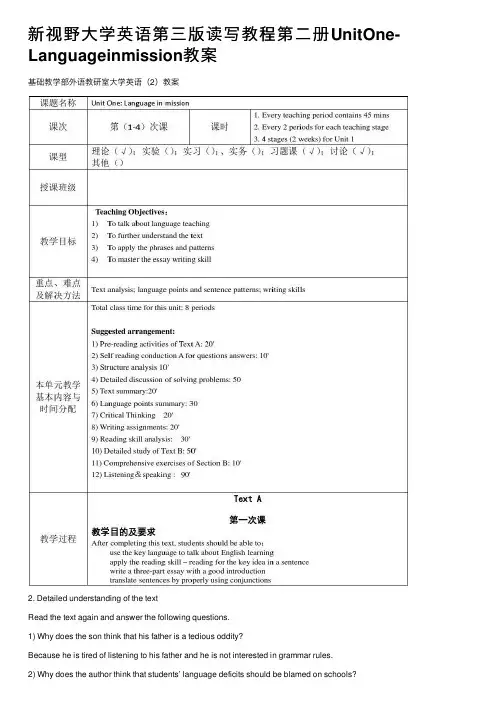
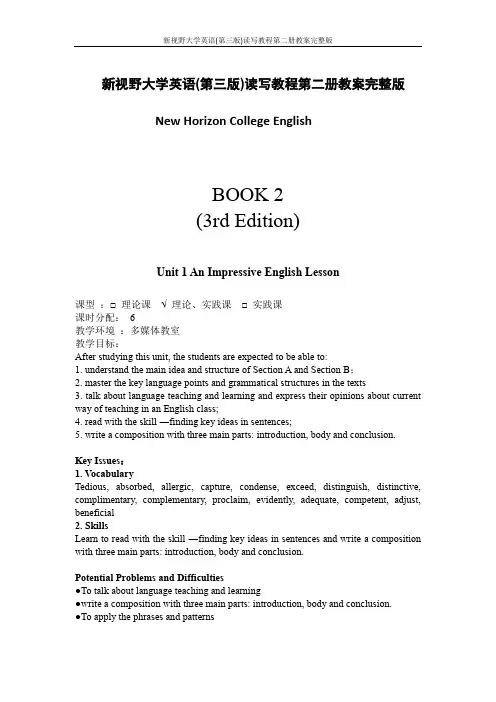
新视野大学英语(第三版)读写教程第二册教案完整版新视野大学英语(第三版)读写教程第二册教案完整版New Horizon College EnglishBOOK 2(3rd Edition)Unit 1 An Impressive English Lesson课型:□ 理论课√ 理论、实践课□ 实践课课时分配:6教学环境:多媒体教室教学目标:After studying this unit, the students are expected to be able to:1. understand the main idea and structure of Section A and Section B;2. master the key language points and grammatical structures in the texts3. talk about language teaching and learning and express their opinions about current way of teaching in an English class;4. read with the skill ―finding key ideas in sentences;5. write a composition with three main parts: introduction, body and conclusion.Key Issues:1. VocabularyTedious, absorbed, allergic, capture, condense, exceed, distinguish, distinctive, complimentary, complementary, proclaim, evidently, adequate, competent, adjust, beneficial2. SkillsLearn to read with the skill ―finding key ideas in sentences and write a composition with three main parts: introduction, body and conclusion.Potential Problems and Difficulties●To talk about language teaching and learning●write a composition with three main parts: introduction, body and conclusion.●To apply the phrases and patternsMethodology:A combination of traditional teaching methods with the communicative approach will be adopted. Special attention should be paid to classroom interaction like questioning and answers. Small group works are always needed while discussing the questions and the difficult translation practice. More encouragement is needed and more guidance will be given in their extracurricular study.Teaching Aids: Visual aids, projector, stereo and microphoneGroup work and pair workConduct of Tasks and Activities(师生互动方式Mode of Interaction; 学习策略Learning Strategies)Students-centered, Task-based teaching and learningTeaching ProceduresStep 1 Lead-inI. Greeting and warming-up questions discussion.1. What are the key factors that help people learn English as a foreign language?2. Do you have any problem in English learning?3. Do you think grammar is important in English learning?II. Listening and discussing.1. Listening practice.2. In your opinion, what is the most effective way to learn English?III. Listening to a talk and answer questions on page 2Step 2 Section A An Impressive English LessonI. Cultural background American university education1.What is Communicative Language Teaching?A type of teaching method;Develop the communicative ability as well as the knowledge of grammar; Learning by doing;Make classroom situation of real foreign language environment.2. What are the features of Communicative Language Teaching?Communicative competence is the goal;An integration of grammatical and functional teaching;Accuracy is secondary to conveying a message;Focus on communicative and contextual factors in language use;Learner-centered and experience-based.3. What is the role of teacher in Communicative Language Teaching?A facilitator of students’ learning;A manager of classroom activities;An advisor of students’ questions;A co-communicator in the communicative activity.II. Language PointsWords and expressions1. oddity: n. [C] a strange or unusual person or thing 怪人;怪物;奇特的东西With his neat suits on, he felt like an oddity walking in this poor neighborhood. 穿着笔挺的西装走在这个贫民区里,他觉得自己就像个怪物。
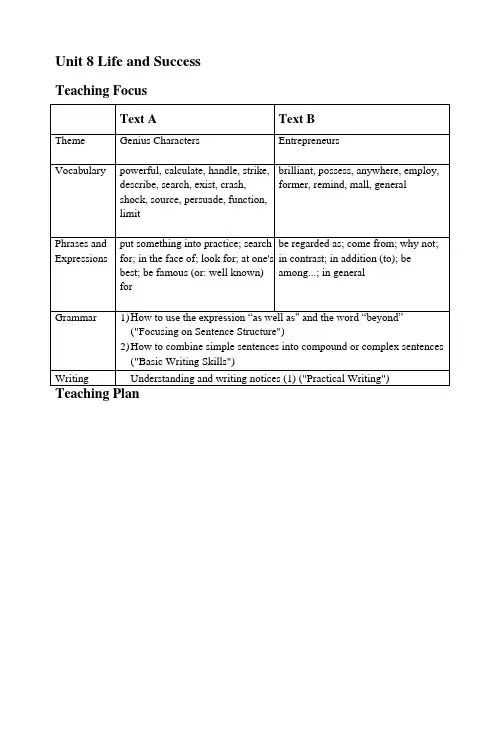
Unit 8 Life and Success Teaching FocusLeading In and Exploring the Topic Finish the listening exercise ofExploring the Topic on Pl 38.• Work in pairs. Each one chooses one of the characters that hebelieves a genius should have and shares it with his partner bygiving an example or examples.Section A Reading Through Go through the text together with the classto make sure the students understand each sentence in the text• Divide the class into six groups. Ask each group to write down aparagraph by stating a genius quality and supporting the qualityby examples given in the text, using their own words.• Ask one representative from each group to share their paragraphswith the class.• Encourage the class to challenge each group's ideas after theyfinish sharing.• Allow the class five minutes to discuss the following twoquestions:1) Besides the qualities mentioned in the text, what otherthings do you think are also important for someone to be a genius?2) Will the text have an effect on you? What can you learn fromthe text?Basic Writing Skills Prepare a PPT with sentences of the exercise onP147 and P148 of SB.• Ask some students to tell their answers to the class and explainwhy.• Classify all the answers into compound sentences, and complexsentences, and compound-complex sentences according to therules listed on P147.Section B Reading More • Allow the Ss 10 minutes to be familiar withthe content of the text and find the answers to the following questions:1) Who is Jeff Bezos?2) What does an entrepreneur mean?3) What are the two qualities all entrepreneurs have in common?教学活动 安排建议教学活动 安排建议4)Do all the entrepreneurs have similar background?5)Do all the entrepreneurs start their careers at a youngage?•Encourage some volunteers to share their answers with the class.Give help where necessary.•Ask the class to discuss the following three questions in groups:1)Do you agree that entrepreneurs are among the mostrespected people in our society? Why, or why not?2)What do you think of the two qualities possessed by allentrepreneurs?3)Do you have these two qualities? If not, do you wishyourselfto have these two qualities? Why or why not?Section C Practical Writing Guide the students to finish the threeexercises on P155 to P156 of SB according to the samples given.•Ask each student to check his or her partner's work and then chooseseveral students to share what he or she has found with the class.•Help the students if there are anything unclear or incorrect.课后学习设计Finish all the exercises in Unit Eight.❖Read the passage in Reading Out on Page 142 of SB and recite it.O Choose one of the qualities that a genius usually possess which you like best and share it with one of your friend by either spoken or written form.❖Find a Chinese entrepreneur you admire most and see what you can learn from him or her.Moral Reflections。
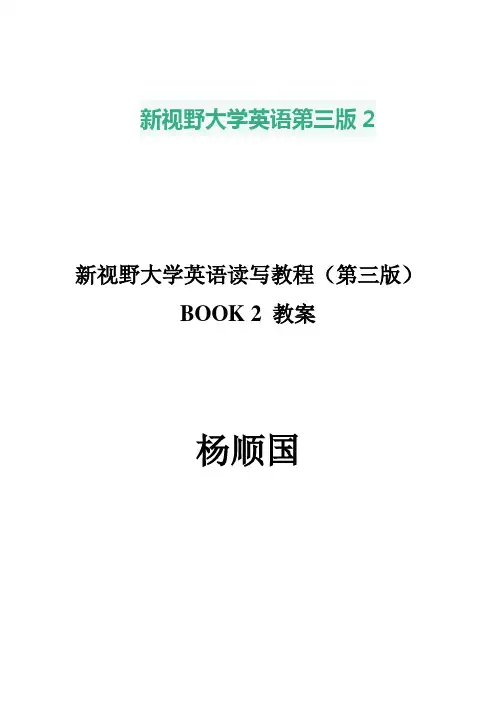
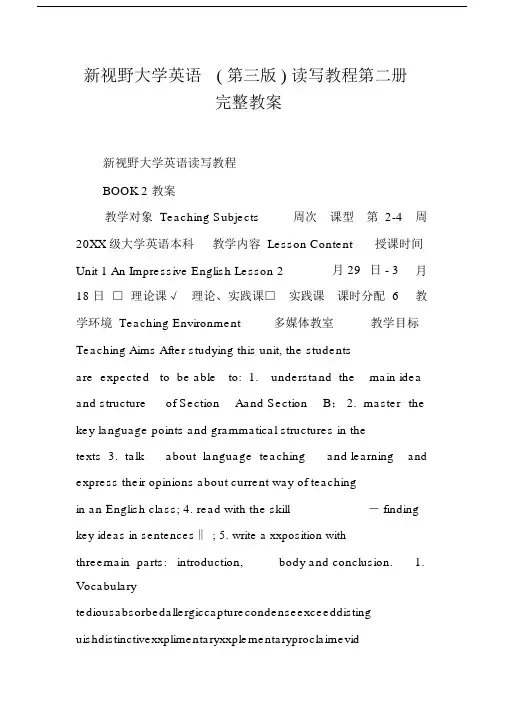
新视野大学英语( 第三版 ) 读写教程第二册完整教案新视野大学英语读写教程BOOK 2 教案教学对象 Teaching Subjects 周次课型第 2-4 周20XX 级大学英语本科教学内容 Lesson Content 授课时间Unit 1 An Impressive English Lesson 2 月 29 日 - 3 月18 日□理论课√ 理论、实践课□ 实践课课时分配 6 教学环境 Teaching Environment 多媒体教室教学目标Teaching Aims After studying this unit, the studentsare expected to be able to: 1. understand the main idea and structure of Section Aand Section B; 2. master the key language points and grammatical structures in thetexts 3. talk about language teaching and learning and express their opinions about current way of teachingin an English class; 4. read with the skill ― finding key ideas in sentences‖ ; 5. write a xxposition withthreemain parts: introduction, body and conclusion. 1. Vocabulary tediousabsorbedallergiccapturecondenseexceeddisting uishdistinctivexxplimentaryxxplementaryproclaimevidentlyadequatexxpetentadjustbeneficial 2. Skills ●Learn to read with the skill ― finding key ideas in sentences ‖and write a xxposition with threemain parts: introduction, body and conclusion. ● To talk about language teaching and learning ● write a xxposition with threemain parts: introduction, bodyand conclusion. ● To apply the phrases and patterns 重点 Key Issues 难点 PotentialProblems and Difficulties教学方法Methodology A xxbination of traditional teaching methods with the xxmunicative approach willbe adopted. Special attention should be paid to classroom interaction like questioning and answers.Small group works are always needed while discussingthe questions and the difficult translation encouragement is needed and more guidance will be given in their extracurricular study. Visual aids, projector, stereo and microphone 教具 Teaching Aids 教学分组Teaching Groups Group work and pair work 课堂学习任务与活动的组织 Conduct of Tasks and Activities Students-centered Task-based teaching and learning教学过程设计Teaching Procedures 步骤 1Step 1 导入Lead-in warming-up questions discussion. 1. What arethe key factors that help people learn English as aforeign language 2. Do you have any problem in Englishlearning you think grammar is important in Englishlearning II. Listening and discussing. 1. Listeningpractice. 2. In your opinion, what is the most effectiveway to learn English III. Listening to a talk and answer questions on page 2 步 2Step 2 文学 Section A An Impressive English Lesson I. New words 1. tedious: a.boring and continuing for too long冗乏味的Tellingthe story has bexxe tedious, as I have done it so manytimes. 述个故事已得乏味,因我已了么多次了。
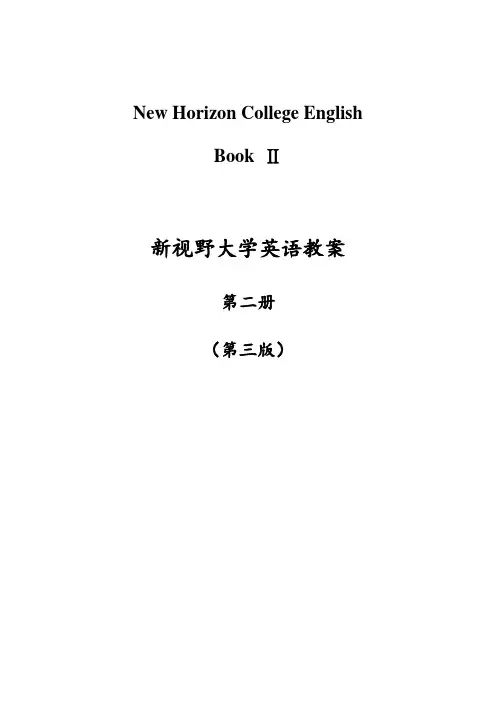
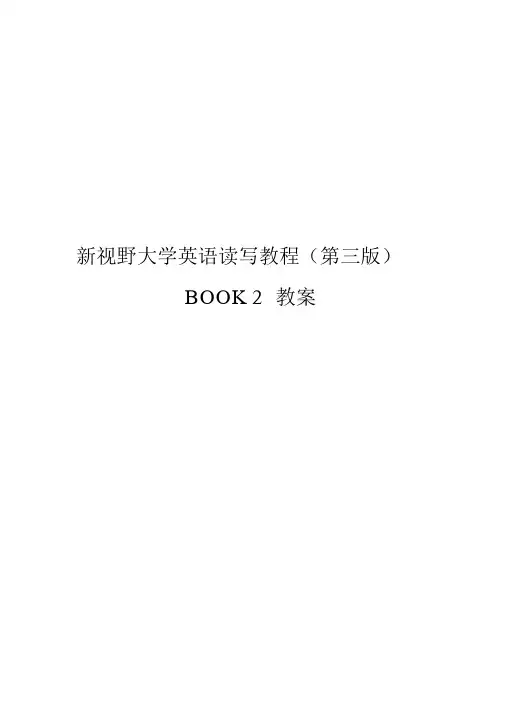
新视野大学英语读写教程(第三版)BOOK 2 教案教学对象Teaching Subjects 周次课型课时分配教学目标Teaching Aims重点Key Issues教学内容Unit 1 An Impressive English 2015 级大学英语本科LessonLesson Content第 2-4周授课时间2月 29日 -3月 18日□ 理论课√ 理论、实践课□ 实践课教学环境6Teaching多媒体教室EnvironmentAfter studying this unit, the students are expected to be able to:1.understand the main idea and structure of Section A and Section B ;2.master the key language points and grammatical structures in the texts3.talk about language teaching and learning and express their opinions about current way ofteaching in an English class;4. read with the skill finding key― ideas in sentences ‖;5.write a composition with three main parts: introduction, body and conclusion.1.Vocabularytedious absorbed allergic capture condense exceed distinguish distinctive complimentary complementary proclaim evidently adequate competent adjust beneficial2. Skills●Learn to read with the skill ―finding key ideas in sentences‖and write a composition withthree main parts: introduction, body and conclusion.难点● To talk aboutlanguage teaching and learningPotential Problems●write a composition with three main parts: introduction, body and conclusion.and Difficulties● To apply the phrases andpatternsA combination of traditional teaching methods with the communicative approach will beadopted. Special attention should be paid to classroom interaction like questioning and 教学方法answers. Small group works are always needed while discussing the questions and the Methodologydifficult translation practice. More encouragement is needed and more guidance will begiven in their extracurricular study.教具Teaching Visual aids, projector, stereo and microphoneAids教学分组Teaching Group work and pair workGroups课堂学习任务与活动的组织Conduct of Tasks and Activities(师生互动方式Mode of Interaction;学习策略Learning Strategies)Students-centeredTask-based teaching and learning教学过程设计Teaching Procedures步骤 1 Step 1导入Lead-inI.Greeting and warming-up questions discussion.1.What are the key factors that help people learn English as a foreign language?2.Do you have any problem in English learning?3.Do you think grammar is important in English learning?II.Listening and discussing.1.Listening practice.2.In your opinion, what is the most effective way to learn English?III.Listening to a talk and answer questions on page 2步骤 2 Step 2 课文学习Section A An Impressive English LessonI. New words1. tedious: a. boring and continuing for too long冗长乏味的Telling the story has become tedious, as I have done it so many times.讲述这个故事已变得单调乏味,因为我已经讲了这么多次了。
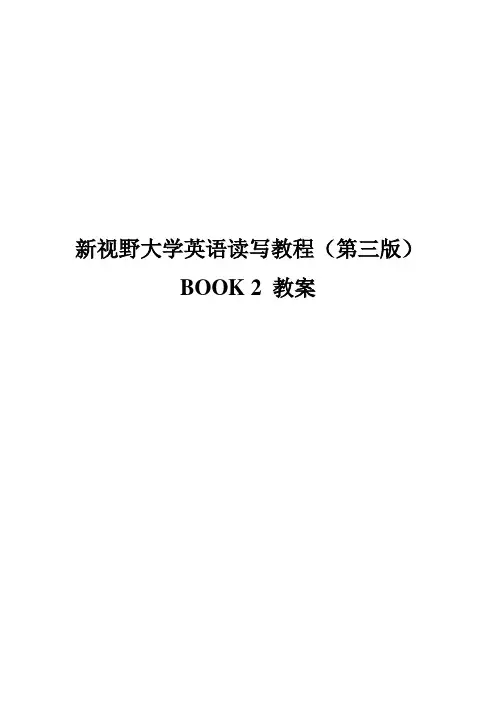
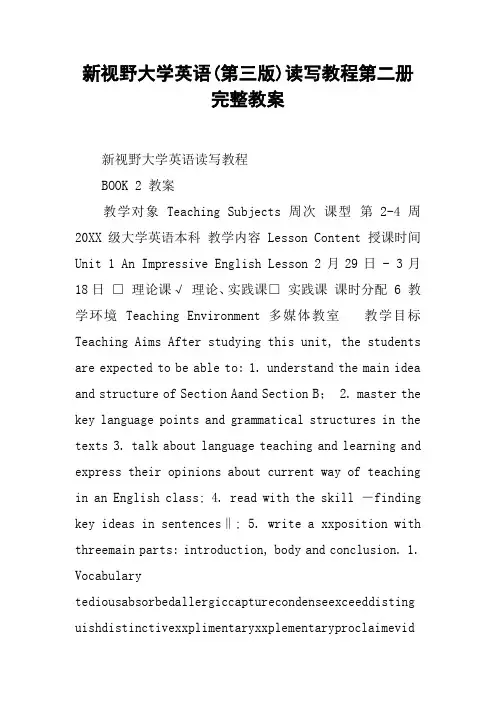
新视野大学英语(第三版)读写教程第二册完整教案新视野大学英语读写教程BOOK 2 教案教学对象 Teaching Subjects 周次课型第2-4周20XX级大学英语本科教学内容 Lesson Content 授课时间Unit 1 An Impressive English Lesson 2月29日 - 3月18日□理论课√理论、实践课□实践课课时分配 6 教学环境 Teaching Environment 多媒体教室教学目标Teaching Aims After studying this unit, the students are expected to be able to: 1. understand the main idea and structure of Section Aand Section B; 2. master the key language points and grammatical structures in the texts 3. talk about language teaching and learning and express their opinions about current way of teaching in an English class; 4. read with the skill ―finding key ideas in sentences‖; 5. write a xxposition with threemain parts: introduction, body and conclusion. 1. Vocabulary tediousabsorbedallergiccapturecondenseexceeddisting uishdistinctivexxplimentaryxxplementaryproclaimevidentlyadequatexxpetentadjustbeneficial 2. Skills ●Learn to read with the skill ―finding key ideas in sentences‖and write a xxposition with threemain parts: introduction, body and conclusion. ●To talk about language teaching and learning ●write a xxposition with threemain parts: introduction, body and conclusion. ●To apply the phrases and patterns 重点 Key Issues 难点 PotentialProblems and Difficulties 教学方法Methodology A xxbination of traditional teaching methods with the xxmunicative approach will be adopted. Special attention should be paid to classroom interaction like questioning and answers. Small group works are always needed while discussing the questions and the difficult translation encouragement is needed and more guidance will be givenin their extracurricular study. Visual aids, projector, stereo and microphone 教具 Teaching Aids 教学分组Teaching Groups Group work and pair work 课堂学习任务与活动的组织Conduct of Tasks and Activities Students-centered Task-based teaching and learning 教学过程设计 Teaching Procedures 步骤1Step 1 导入Lead-in warming-up questions discussion. 1. What arethe key factors that help people learn English as a foreign language 2. Do you have any problem in English learning you think grammar is important in English learning II. Listening and discussing. 1. Listening practice. 2. In your opinion, what is the most effective way to learn English III. Listening to a talk and answer questions on page 2 步骤 2Step 2课文学习Section A An Impressive English Lesson I. New words 1. tedious: a. boring and continuing for too long 冗长乏味的 Telling the story has bexxe tedious, as I have done it so many times. 讲述这个故事已变得单调乏味,因为我已经讲了这么多次了。
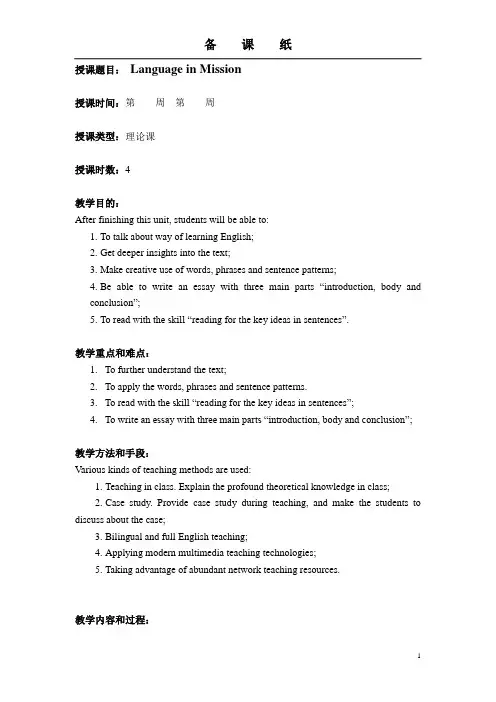
授课题目:Language in Mission授课时间:第____周第____周授课类型:理论课授课时数:4教学目的:After finishing this unit, students will be able to:1.To talk about way of learning English;2.Get deeper insights into the text;3.Make creative use of words, phrases and sentence patterns;4.Be able to write an essay with three main parts “introduction, body andconclusion”;5.To read with the skill “reading for the key ideas in sentences”.教学重点和难点:1.To further understand the text;2.To apply the words, phrases and sentence patterns.3.To read wit h the skill “reading for the key ideas in sentences”;4.To write an essay with three main parts “introduction, body and conclusion”;教学方法和手段:Various kinds of teaching methods are used:1.Teaching in class. Explain the profound theoretical knowledge in class;2.Case study. Provide case study during teaching, and make the students to discuss about the case;3.Bilingual and full English teaching;4.Applying modern multimedia teaching technologies;5.Taking advantage of abundant network teaching resources.教学内容和过程:Section A An Impressive English LessonStep One Warming-up Activities 30 minutesI.Lead-in:Discuss the following questions:1.What are the key factors that help people learn English as a foreign language? Good course, excellent syllabus based on some principles;Highly developed methodologies, teaching four primary skills of language acquisition; Put the four skills into a discourse;Analyze three different kinds of interactions.2.Do you have any problem in English learning?— I always feel it difficult t o…—It’s not easy for me to…understand what others say;remember so many words;learn the grammar;read quickly;speak in public…3.Do you think grammar is important in English learning?—Yes.The basic building blocks of a language;essential for effective communication;put the words in the right order;help to convey correct, meaningful message.—No.as long as one can understand what other is saying;dynamic and no language is fixed;speak their native language without having studied its grammar.II.Cultural backgroundAmerican university education1.What is Communicative Language Teaching?A type of teaching method;Develop the communicative ability as well as the knowledge of grammar; Learning by doing;Make classroom situation of real foreign language environment.2. What are the features of Communicative Language Teaching? Communicative competence is the goal;An integration of grammatical and functional teaching;Accuracy is secondary to conveying a message;Focus on communicative and contextual factors in language use;Learner-centered and experience-based.3. What is the role of teacher in Communicative Language Teaching?A facilitator of students’ learning;A manager of classroom activities;An advisor of students’ questions;A co-communicator in the communicative activity.Step Two Text Study 80 minutesI.Interactive reading of the text1. Reading comprehension1)What does the son think of the father? (Para. 1)A tedious oddity: a father he is obliged to listen to and a man absorbed in therules of grammar.2)Why was the writer shocked by his student’s answer? (Paras. 2-4)She is unable to describe her excursion to Europe with the right words.3)What conclusion did the writer draw from the example of his student?(Para. 5)Students unfairly bear the bulk of the criticism for these knowledge deficits because there is a sense that they should know better.4)Why should students not be blamed for their language deficiency? (Paras. 6-7)The learning environment is misleading.5)Why should students not be blamed for their language deficiency? (Paras.6-7)They are not learning the language adequately and efficiently in school.6)How should grammar be taught as far as the writer is concerned? (Paras.8-10)Grammar must be handled delicately, step by step. An effective way ofteaching could arouse children’s interest in learning English grammar.An example: a grammar lesson with my son2. Structure of the textIntroductionIn his son’s eyes, the father is one who he has to obey and an oddity absorbed in grammar. (Para.1)He was shocked by his student’s inability todescribe properly her excursion to Europe. (Paras. 2-4)Thesis of the narration: It is unfair to blame students for their language deficiency. (Para.5)BodyExplains why stud ents shouldn’t be blamed for their language deficiency by providing two reasons and one example. (Paras. 6-10)Elaborates the importance of grammar and vocabulary in learning English. (Paras. 11-13)Concluding partNarrates another incident where his son unconsciously uttered a grammatically perfect sentence with a subjunctive mood, which made the author so proud of his son. (Paras. 14-17)3. Summary of the TextTo my son, I am a _____________: a father he is __________ listen to and a man ____________ the rules of grammar. And I got ______________ this because my student was unable to describe properly her feeling on her __________ to Europe. However, it doesn’t ________________ to criticize our students. They unfairly bear the bulk of the criticism for these __________________ because there is a sense that they _________________. On one hand, they are misled by the____________. On the other hand, school fails to _________________ the essential framework of language, accurate grammar and proper vocabulary.Perhaps, language should be looked upon as a _________ and a ___________________: often study the road map (check grammar) and ________ the car engine (adjust vocabulary). Learning grammar and a good vocabulary is just like driving with a road map in a ________________ car. __________, _________, and __________ communication depends upon grammar and a good vocabulary, the two __________ assets for students, but they are ________________ in schools.II. Language FocusWords and expressions1. oddity: n. [C] a strange or unusual person or thing 怪人;怪物;奇特的东西With his neat suits on, he felt like an oddity walking in this poor neighborhood.穿着笔挺的西装走在这个贫民区里,他觉得自己就像个怪物。
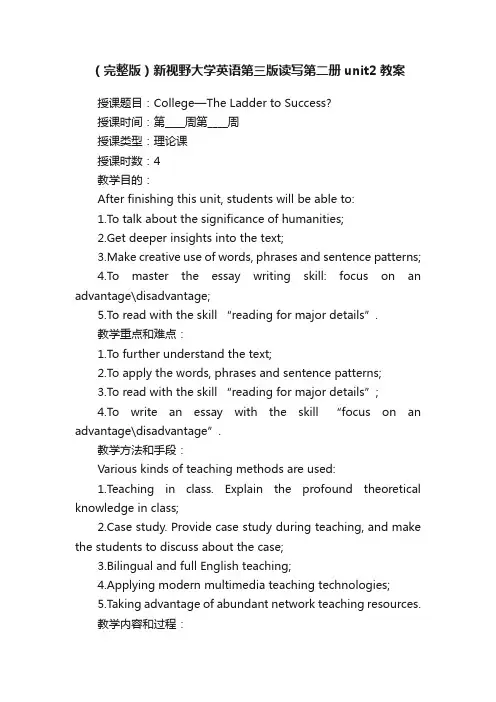
(完整版)新视野大学英语第三版读写第二册unit2教案授课题目:College—The Ladder to Success?授课时间:第____周第____周授课类型:理论课授课时数:4教学目的:After finishing this unit, students will be able to:1.To talk about the significance of humanities;2.Get deeper insights into the text;3.Make creative use of words, phrases and sentence patterns;4.To master the essay writing skill: focus on an advantage\disadvantage;5.To read with the skill “reading for major details”.教学重点和难点:1.To further understand the text;2.To apply the words, phrases and sentence patterns;3.To read with the skill “reading for major details”;4.To write an essay with the skill “focus on an advantage\disadvantage”.教学方法和手段:Various kinds of teaching methods are used:1.Teaching in class. Explain the profound theoretical knowledge in class;2.Case study. Provide case study during teaching, and make the students to discuss about the case;3.Bilingual and full English teaching;4.Applying modern multimedia teaching technologies;5.Taking advantage of abundant network teaching resources.教学内容和过程:Section A The humanities: Out of date?Step One Warming-up Activities 30 minutesI.Lead-in:Discuss the following questions:1.How do you think of your current major? If you were givena second chance to choose your major, what would you select and why?—If I were given a second chance to choose my major, I would choose …/ I think being a … is …— accounting, computer science, psychology,—civil engineering, philo sophy, medical technology …—popular, interesting, enjoyable, promising, practical, meaningful, beneficial, well-pa id …2. What liberal arts / humanities courses do you learn in college? Do you think they are necessary for your education?—I learn Chinese, English, philosophy, psychology, history … in college. I think they are an essential part of the college education and benefit me a lot.gain more insight in life and societybetter understand and predict human behaviorrealize different interpretations of life and historyunderstand the past which has created the presentbe aware of cultural a nd religious differencesII.Cultural background1. What are the humanities?The humanities are a group of academic disciplines that study the human condition, using methods that are primarily analytical, critical, or speculative. Therefore, they are distinguished from the approaches of natural sciences. The humanities, called social sciences, include history, anthropology,communication studies, cultural studies, law, linguistics, etc.2. Why are the humanities important?Through exploration of the humanities, students learn how to think creativelyand critically, to reason, and to ask questions. Because these skills allow students to gain new insights into everything from poetry and paintings to business models and politics, humanistic subjects have been at the heart of a liberal arts education. Today, humanistic knowledge continues to provide the ideal foundation for exploring and understanding the human experience.Step Two Text Study 80 minutesI.Interactive reading of the text1. Reading comprehension1)Why do many students calculate they can’t major in English or history?2)Why does the author say that a college education is more and more seen as ameans for economic betterment rather than a means for human betterment?3)How do you understand “These days, labs are more vivid and compellingthan libraries” (Para. 3)?4)Why does the author say that the inner aspect of our being has captured ourimagination from the very beginning?5)According to the author, what are the advantages of studying the humanities?6)What are “well-rounded human beings” (Para. 10) according to the author?2. Structure of the textPart 1 (Para, 1-5) IntroductionTo improve their future chances of finding a job, college students are now moving away from the humanities and taking accounting or some “hard-skill” courses. The humanities will continue to be in bad shape due to the economic downturn. Nevertheless, the humanities can bring true value to people’s lives, and the basis of study of the humanities is formed by the inner power that has driven human beings to either greatness or destruction.Part 2 (Para. 6-9) Body: Why the humanities?This part presents the author’s argument to st and up for the true value that the humanities bring to people’s lives.Part 3 (Para 10) Concluding partThe humanities help to create human beings with insight and understanding of the passions, hopes and dreams common to all humanity. The humanities will never be out of date. They are as useful and relevant in our modern age as they have always been.3. Summary of the TextRetell the text according to the following tips.1)(Part I) When the job market worsens, many students calculate ... Probably, the huma nities will continue …. Once …, the humanities now …2)(Part II) Here, please allow me to … that the humanities add to people’s lives. Studying the humanities improves… Most importantly, studying the humanities invests us with …, thereby… Perhaps the best argument in favor of the humanities is… In fact, increasingly… is seen as the ideal in…3)(Part III) In summ ary, the humanities help to create …, teach us to … and… It makes sense to …, our outstanding andremarkable …/doc/e2acb604e65c3b3567ec102de2bd960 591c6d940.html nguage FocusWords and expressions1. when the going gets tough: when the situation becomes difficultWhen the going gets tough, women can get as tough as men.当形势变得严峻时,女人可以变得跟男人一样坚强。
新视野大学英语读写教程(第三版)第二册unit1教案一、教学目标1. 语言知识目标(1)掌握本单元核心词汇和短语,如perspective, dilemma, dilemma等,能在语境中正确运用(2)理解并运用本单元重点语法结构,如虚拟语气、倒装句等(3)了解英语议论文的结构特点,掌握论点、论据、论证等要素2. 语言技能目标(1)能听懂与本单元主题相关的英语材料,提取关键信息(2)能就本单元话题进行35分钟的英语演讲,表达观点(3)能阅读并理解与本单元主题相关的英语文章,分析作者观点(4)能写一篇150200词的英语议论文,结构完整,论证有力3. 情感态度目标(1)培养学生多角度思考问题的能力,学会换位思考(2)激发学生对跨文化交流的兴趣,增强文化自信(3)培养学生批判性思维,提高分析问题、解决问题的能力二、教学重点与难点1. 教学重点(1)重点词汇和短语的准确理解和运用(2)虚拟语气和倒装句的语法规则及其在语境中的使用(3)议论文写作技巧,特别是论点的提出和论证的展开2. 教学难点(1)虚拟语气在不同语境中的灵活运用(2)倒装句的正确使用,特别是部分倒装和完全倒装的区分(3)议论文写作中逻辑思维的培养和论证技巧的掌握三、教学方法1. 任务型教学法设计真实情境任务,如模拟联合国辩论、跨文化交流角色扮演等,让学生在完成任务的过程中运用所学知识,提高语言实际运用能力。
2. 合作学习法采用小组合作学习模式,组织学生进行pair work和group discussion,通过头脑风暴、角色扮演等活动,培养学生的团队协作能力和沟通技巧。
3. 多媒体辅助教学利用视频、音频、图片等多媒体资源,创设生动有趣的学习情境,激发学生的学习兴趣,提高课堂参与度。
4. 项目式学习设计跨学科项目,如"全球视野下的文化差异"主题研究,引导学生进行调查研究、数据分析,培养其批判性思维和创新能力。
5. 翻转课堂课前布置预习任务,课堂上重点解决疑难问题,增加师生互动和学生实践机会,提高课堂效率。
新视野大学英语(第三版)第二册读写教程、视听说教程全部答案+教案(Units1-7)New Horizon College EnglishBOOK 2(3rd Edition)Unit 1 Text AEx.1 Understanding the text1、Because he is tired of listening to his father and he is not interested in grammar rules.2、The civilization of Greece and the glory of Roman architecture are so marvelous and remarkable that they should be described at least in a brief account; however, what the student could do was only one single ut terance :“whoa!” without any any specific comment.3、Because the schools fail to set high standards of language proficiency. They only teach a little grammar and less advanced vocabulary. And the younger teachers themselves have little knowledge of the vital structures of language.4、Because teaching grammar is not an easy job and most of the students will easily get bored if it’s not properly dealt with.5、He familiarized his son with different parts of speech in a sentence and discussed their specific grammatical functions including how to use adverbs to describe verbs.6、Because the son had never heard about the various names and functions of words in an English sentence before.7、The author uses “road map”and “car”to describe grammar and vocabulary. Here,“road map”is considered as grammar and “car”as vocabulary.8、Since the subjunctive mood his son used is a fairly advanced grammar structure, the interjection“whoa!”reflects the tremendous pride the father had toward his son; it also reflects the author’s humor in using the word because it was once used by his student, though in two different situations and with two different feelings.Ex.3 Words in use1.condense2.exceed3.deficit4.exposure5.asset6.adequate/doc/694713736.html,petent8.adjusting9.precisely 10.beneficialEx.4 Word building-al/-ial:managerial/editorial/substance/survival/tradition/margin -cy : consistency/accuracy/efficient-y : recovery/ministry/assemblyEx.5 Word building1.editorial2.recovery3.accuracy4.substance5.managerial6.margin7.assembly8.Ministry9.survival 10.tradition 11.consistency 12.efficientEx.6 Banked cloze1-5: L C J A I 6-10: O N E H FEx.7 Expressions in use1.feel obliged to2.be serious about3.run into4.distinguish between5.thrust upon6.was allergic to7.get lost8.be attracted to9.make sense 10.looked upon asEx.8 Structured writingSome bookworms in my dormitory often spend hours reading their “Bible”, Practical English Grammar, and do a lot of exercises in that book , but I don’t ca re about it at all. My assumption is since I have never learned Chinese grammar, what’s the sense of learning English grammar? In fact, English grammar has always been a big headache to me.English grammar is very complicated because, unlike Chinese, there are many verb tenses. Even stranger than verb tenses, English grammar also contains something very confusing. For example, I don’t remember how many times my middle school teacher tried to“impose”the differences between used to and be used to on us. Sometimes he would go on with the explanation for 20 minutes or so. He even summarized the differences by listing three or four points for us to memorize. However, they could never stay in my head . I don’t remember how many times I got it wrong with the sentences containingused to or be used to on my exams . I was really confused with these two phrases,and I can never get them right.In brief, I’m allergic to learning English grammar. Curiously, I just wonder if the native speakers of English have a microcomputer in their brain to help them utter the two phrases promptly with just a click of their brain mouse!Ex.9 E-C Translation人们普遍认为英语是一种世界语言,经常被许多不以英语为第一语言的国家使用。
授课题目:Language in Mission授课时间:第____周第____周授课类型:理论课授课时数:4教学目的:After finishing this unit, students will be able to:1.To talk about way of learning English;2.Get deeper insights into the text;3.Make creative use of words, phrases and sentence patterns;4.Be able to write an essay with three main parts “introduction, body andconclusion”;5.To read with the skill “reading for the key ideas in sentences”.教学重点和难点:1.To further understand the text;2.To apply the words, phrases and sentence patterns.3.To read wit h the skill “reading for the key ideas in sentences”;4.To write an essay with three main parts “introduction, body and conclusion”;教学方法和手段:Various kinds of teaching methods are used:1.Teaching in class. Explain the profound theoretical knowledge in class;2.Case study. Provide case study during teaching, and make the students to discuss about the case;3.Bilingual and full English teaching;4.Applying modern multimedia teaching technologies;5.Taking advantage of abundant network teaching resources.教学内容和过程:Section A An Impressive English LessonStep One Warming-up Activities 30 minutesI.Lead-in:Discuss the following questions:1.What are the key factors that help people learn English as a foreign language? Good course, excellent syllabus based on some principles;Highly developed methodologies, teaching four primary skills of language acquisition;Put the four skills into a discourse;Analyze three different kinds of interactions.2.Do you have any problem in English learning?— I always feel it difficult t o…—It’s not easy for me to…understand what others say;remember so many words;learn the grammar;read quickly;speak in public…3.Do you think grammar is important in English learning?—Yes.The basic building blocks of a language;essential for effective communication;put the words in the right order;help to convey correct, meaningful message.—No.as long as one can understand what other is saying;dynamic and no language is fixed;speak their native language without having studied its grammar.II.Cultural backgroundAmerican university education1.What is Communicative Language Teaching?A type of teaching method;Develop the communicative ability as well as the knowledge of grammar; Learningby doing;Make classroom situation of real foreign language environment.2. What are the features of Communicative Language Teaching? Communicative competence is the goal;An integration of grammatical and functional teaching;Accuracy is secondary to conveying a message;Focus on communicative and contextual factors in language use;Learner-centered and experience-based.3. What is the role of teacher in Communicative Language Teaching?A facilitator of students’ learning;A manager of classroom activities;An advisor of students’ questions;A co-communicator in the communicative activity.Step Two Text Study 80 minutesI.Interactive reading of the text1. Reading comprehension1)What does the son think of the father? (Para. 1)A tedious oddity: a father he is obliged to listen to and a man absorbed in therules of grammar.2)Why was the writer shocked by his student’s answer? (Paras. 2-4)3)She is unable to describe her excursion to Europe with the right words.4)What conclusion did the writer draw from the example of his student?(Para. 5)Students unfairly bear the bulk of the criticism for these knowledge deficits because there is a sense that they should know better.5)Why should students not be blamed for their language deficiency? (Paras.6-7)6)The learning environment is misleading.7)Why should students not be blamed for their language deficiency?(Paras.6-7)8)They are not learning the language adequately and efficiently in school.9)How should grammar be taught as far as the writer is concerned?(Paras.8-10)10)Grammar must be handled delicately, step by step. An effective way ofteaching could arouse children’s interest in learning English grammar.11)An example: a grammar lesson with my son12)2. Structure of the textIntroductionIn his son’s eyes, the father is one who he has to obey and an oddity absorbed in grammar. (Para.1)He was shocked by his student’s inability todescribe properly her excursion to Europe. (Paras. 2-4)Thesis of the narration: It is unfair to blame students for their language deficiency. (Para.5)BodyExplains why stud ents shouldn’t be blamed for their language deficiency by providing two reasons and one example. (Paras. 6-10)Elaborates the importance of grammar and vocabulary in learning English. (Paras. 11-13)Concluding partNarrates another incident where his son unconsciously uttered a grammatically perfect sentence with a subjunctive mood, which made the author so proud of his son. (Paras. 14-17)3. Summary of the TextTo my son, I am a _____________: a father he is __________ listen to and a man ____________ the rules of grammar. And I got ______________ this because my student was unable to describe properly her feeling on her __________ to Europe.However, it doesn’t ________________ to criticize our students. They unfairly bear the bulk of the criticism for these __________________ because there is a sense that they _________________. On one hand, they are misled by the____________. On the other hand, school fails to _________________ the essential framework of language, accurate grammar and proper vocabulary.Perhaps, language should be looked upon as a _________ and a ___________________: often study the road map (check grammar) and ________ the car engine (adjust vocabulary). Learning grammar and a good vocabulary is just likedriving with a road map in a ________________ car. __________, _________, and __________ communication depends upon grammar and a good vocabulary, the two __________ assets for students, but they are ________________ in schools.II. Language FocusWords and expressions1. oddity: n. [C] a strange or unusual person or thing 怪人;怪物;奇特的东西With his neat suits on, he felt like an oddity walking in this poor neighborhood.穿着笔挺的西装走在这个贫民区里,他觉得自己就像个怪物。
基础教学部外语教研室大学英语(2)教案use English learning strategies consciously教学重难点Using proper language to talk about English learningHow to apply the reading skill – reading for the key idea in a sentence教学材料教学方法1. 教学材料:Text A课文、练习2. 教学方法:Under the guidance of student-centered principle, apply communicative and heuristic teaching methods, stimulate students’ interest in learning English and get students involved in class participation教学过程一、课前导入Talking about your experience of learning EnglishWatch the video clip and discuss the following question in pairs.1)According to the speaker, in what ways did Chinese students learn English?Chinese students practice their English by screaming it.2)Do you agree with what he said about Chinese students learning English? Why or why not.Yes, I just learned English exactly that way.No, we have learned English in different ways.3)How do you learn English? What do you think of your way of English learning?I learn English by:listening to the teacher carefully in classtaking notes …to go over lessons latercatching every chance to practice speakinglistening and reading a lotdoing enough exercises to practice grammar rulesI think my way of English learning is:effective, ineffective, interesting, boringchallenging but rewardingexamination-oriented二、文本学习1. Global understanding of the text1)Scan the text in three minutes and fill in the blanks.After I read the passage, I know the text talking about how _________ and __________ can be taught efficiently. The writer might be a ________ and a ________________ as well.2)What is the writing style of the text? Why?The writing style of the text is relaxed, which is proved by a lot of short sentences and paragraphs, casual verbs, daily talks and simple modifiers.3)Map the text structure and fill in the blanks.2. Detailed understanding of the textRead the text again and answer the following questions.1) Why does the son think that his father is a tedious oddity?Because he is tired of listening to his father and he is not interested in grammar rules.2) Why does the author think that students’ language deficits should be blamed on schools?Because the schools fail to set high standards of language proficiency. They only teach a little grammar and less advanced vocabulary. And the younger teachers themselves have little knowledge of the vital structures of language.3) What does the father teach the son while giving him a grammar lesson?He familiarized his son with different parts of speech in a sentence and discussed their specific grammatical functions including how to use adverbs to describe verbs.4) What are the two things that the author uses to describe grammar and vocabulary?The author uses “road map” and “car” to describe grammar and vocabulary. Here, “road map” is considered as grammar and “car” as vocabulary.5) How do you understand the interjection “whoa!” said by the father toward the end of the text?Since the subjunctive mood his son used is a fairly advanced grammar structure, the interjection “whoa!” reflects the tremendous pride the father had toward his son; it also reflects the author’s humor in using the word because it was once used by his student, though in two different situations and with two different feelings.第二次课一、文本拓展1) Text SummaryAn Impressive English LessonTo my son, I am a _____________: a father he is __________ listen to and a man ____________ the rules of grammar. And I got ______________ this because my student was unable to describe properly her feeling on her __________ to Europe.However, it doesn’t ________________ to criticize our students. They unfairly bear the bulk of the criticism for these __________________ because there is a sense that they _________________. On one hand, they are misled by the____________. On the other hand, school fails to _________________ the essential framework of language, accurate grammar and proper vocabulary. Perhaps, language should be looked upon as a _________ and a ___________________: often study the road map (check grammar) and ________ the car engine (adjust vocabulary). Learning grammar and a good vocabulary is just like driving with a road map in a ________________ car. __________, _________, and __________ communication depends upon grammar and a good vocabulary, the two __________ assets for students, but they are ________________ in schools.2) Language Points3. Criticl thinking1)What do you think of the “impressive English lesson”? Is it effective?●Yes. Because the lesson aroused children’s interest in learning English grammar.●Yes. Because the way to learn grammar is more natural, interesting and enjoyable.●Yes, because learners become more motivated when learning something they like.●No. because it’s like a street le arning without formal instruction.2) Do you think English grammar helps you a lot in learning English? Why or why not?English grammar helps a lot:●Order sentences correctly.●Use words properly.●Talk with other English speakers confidentlyEnglish grammar is of little help:●Only give rules that are hard to remember.●It is not helpful in a real-life setting due to the limited time to think and recall the rules.●Not always applicable to the real language, especially idioms.3) How can you effectively enlarge your vocabulary?●Read more English from online sources.●Watch English TV / listen to English radio / watch English online videos.●Talk often with English speakers.●Listen carefully and extensively.●Use dictionaries to look up unfamiliar words.●Use new words as often as possible.二、写作训练 (P13)1)Structure AnalysisAs the name of our textbook implies, we read English in order to write in it. But how to write in the English way?As is known to all of us, what we write reflects what we think; and how we write mirrors how we think. In that light, our best way of writing in English is to know well how to think in English as the American or British people do. What is their way of thinking then?Different from us who think in the spiral way (螺旋式), they tend to think in the linear way (线性方式). As far as paragraph writing is concerned, deduction (演绎法) is typical of their linear way of thinking, as shown below:Starting from this book, you are moving from paragraph writing to short essay writing. In a likely manner, however, we will go through the same process for essay writing as we did for paragraph writing. In college writing, an essay normally has three main parts: introduction, body,What are minor details and what are the main ideas. (Many words in a sentence describe things about the subject of the sentence but they merely find the details to it. If we ask when, what, where, or why, we will find out these details, which further help us to see the key idea of the sentence.)4) What to keep in mind to find out the key idea of a sentence?Of course, we cannot always easily decide which details are simply descriptive and which add much to the key idea. However, the starting point for determining the key idea ina sentence is to find who or what the sentence is about and what the person or object isdoing.2. 文本学习1) Applying the reading skillWhat can the title “The Great Journey of Learning” tell us?The title “The Great Journey of Learning”, coupled with the topic “Language in Mission” of the unit, tells us the central idea—The process of learning has a profound effect on one’s life.2) Detailed understanding of the textRead Text B and choose the best answer to each of the questions (Page 24)Read the text again and think about the following questions:1. Why did Malcolm X want to learn English? (Para.2)Because he was poorly educated, he felt inadequate to teach his new beliefs to others.2. What motivated Malcolm X to launch on a quest to overcome his language deficiencies? Malcolm X’s considerable frustration at his inability to read and write launched him on a quest to overcome his deficiencies.3. How did Malcolm X move from basic literacy toward true proficiency? (Para. 5)He copied dictionary, read everything he had written aloud and logged important things that happened every day. Repetition helped move him from basic literacy toward true proficiency. 4. What did Malcolm X obtain from language learning? (Paras. 9-10) Reading had changed forever the course of Malcolm X’s life. As he acquired knowledge, his horizons expanded. He had left behind the narrow, ignorant world of his youth to join the world community of thoughts and actions ever since he started with his great journey of learning English in prison.3. 知识总结听说训练第四次课教学目的及要求Talk about learning experiencesListen for signal words for listingGive and respond to adviceTalk about learning / teaching methods教学过程1. Listening to the worldSharing1) Watch a podcast for its general idea.The podcast is mainly about the things people are learning at the moment and the most difficult thing they have ever learned.2) Watch Part 1 and fill in the blanks●new things●At the moment●quite difficult3) Watch Part 2 and check the true statements.ListeningListening skillsListening for signal words for listing●Listen for the total number of items at the beginning●Listen for words and expressions that signal the beginning, following and end of the listing⏹ e.g. the last, the final, lastly, and finally●Listing items with equal value⏹ e.g. to begin with, to start with, furthermore, moreover, in addition, besides, what’smore, the last but not the least, lastly, finally●Words and expressions indicating importance⏹expressions: above all, the most important / obvious / noteworthy⏹Adjectives: main, vital, significant, chief, central, principal, primary, major,distinctive, and the –est forms of adjectives1)Listen to a radio program and rearrange the following expressions.e-c-a-g-d-h-b-f2) Listen to the radio program again and complete the table.●speak●saying the wrong thing。
New Horizon College EnglishBOOK 2(3rd Edition)Unit 1 An Impressive English Lesson课型:□ 理论课√ 理论、实践课□ 实践课课时分配:6教学环境:多媒体教室教学目标:After studying this unit, the students are expected to be able to:1. understand the main idea and structure of Section A and Section B;2. master the key language points and grammatical structures in the texts3. talk about language teaching and learning and express their opinions about current way of teaching in an English class;4. read with the skill ―finding key ideas in sentences;5. write a composition with three main parts: introduction, body and conclusion.Key Issues:1. VocabularyTedious, absorbed, allergic, capture, condense, exceed, distinguish, distinctive, complimentary, complementary, proclaim, evidently, adequate, competent, adjust, beneficial2. SkillsLearn to read with the skill ―finding key ideas in sentences and write a composition with three main parts: introduction, body and conclusion.Potential Problems and Difficulties●To talk about language teaching and learning●write a composition with three main parts: introduction, body and conclusion.●To apply the phrases and patternsMethodology:A combination of traditional teaching methods with the communicative approach will be adopted. Special attention should be paid to classroom interaction like questioning and answers. Small group works are always needed while discussing the questions and the difficult translation practice. More encouragement is needed and more guidance will be given in their extracurricular study.Teaching Aids: Visual aids, projector, stereo and microphoneGroup work and pair workConduct of Tasks and Activities(师生互动方式Mode of Interaction; 学习策略Learning Strategies)Students-centered, Task-based teaching and learningTeaching ProceduresStep 1 Lead-inI. Greeting and warming-up questions discussion.1. What are the key factors that help people learn English as a foreign language?2. Do you have any problem in English learning?3. Do you think grammar is important in English learning?II. Listening and discussing.1. Listening practice.2. In your opinion, what is the most effective way to learn English?III. Listening to a talk and answer questions on page 2Step 2 Section A An Impressive English LessonI. Cultural background American university education1.What is Communicative Language Teaching?A type of teaching method;Develop the communicative ability as well as the knowledge of grammar; Learning by doing;Make classroom situation of real foreign language environment.2. What are the features of Communicative Language Teaching?Communicative competence is the goal;An integration of grammatical and functional teaching;Accuracy is secondary to conveying a message;Focus on communicative and contextual factors in language use;Learner-centered and experience-based.3. What is the role of teacher in Communicative Language Teaching?A facilitator of students’ learning;A manager of classroom activities;An advisor of students’ questions;A co-communicator in the communicative activity.II. Language PointsWords and expressions1. oddity: n. [C] a strange or unusual person or thing 怪人;怪物;奇特的东西With his neat suits on, he felt like an oddity walking in this poor neighborhood. 穿着笔挺的西装走在这个贫民区里,他觉得自己就像个怪物。
2. obligeThe word oblige is most commonly used in the expression be/feel obliged. 1) be/feel obliged to do sth. 指“感到有责任做某事”。
例如:He felt obliged to help his mother, even if it meant leaving college. 他觉得有责任帮助母亲,即使这意味着他要离开大学。
2) be/feel obliged to sb./sth. 指“对某人或某事心存感激”。
例如:Thank you very much, doctor. I am extremely obliged to you. 医生,非常谢谢您。
对您,我深表感谢。
3. How was it? (spoken) often used in conversation to ask sb. about their opinion or experience of sth. 怎么样?(口语常用表达,用于询问看法或经历)Did you watch the movie last night? How was it? 你昨天晚上看那部电影了吗?感觉怎么样?I was told that you had traveled to many places in Asia recently. How was it? 有人告诉我你最近跑了亚洲的很多地方,旅行怎么样?4. full of: (followed by abstract nouns) feeling or showing a lot of particular emotion or quality (感觉、表达或表现出)充满某种情感(特质)的full of excitement/energy/hope/happiness/praise 充满兴奋/活力/希望/幸福/赞美The teacher was full of praise for the homework that the students had done. 老师对学生们完成的功课赞不绝口。
Lucy is a happy child and always full of life. 露西是个快乐的孩子,总是充满了活力。
5. “It was, like, whoa!” means “It was really great!”. “It was like …” is an informal expression in conversation, very common for young people who are lazy and incapable to reference their ideas.The expression is usually followed by an adjective or an exclamation. It was, like, marvelous! 简直奇妙极了!(It was like) Whoa! How come you got a hundred percent correct on such a hard test? 哇! 这么难的考试你怎么都全答对了?Note: Whoa is specifically used to show that people are surprised or think something is very impressive. It can be used in different contexts. For example: ﹒To describe something that you’re not quite sure how to describe: That car is so cool, it’s like, whoa.To express surprise: Whoa! It’s really amazing!To indicate a desire to end what someone is talking: Whoa, OK, that’s enough.6. And that was it. (Para. 4)Meaning: And that was everything she said, without even mentioning any details of her wonderful experience in Europe.That was it.: often used in conversation to say that sth. is completely finished or that a situation cannot be changed 就这样(指某事彻底结束或形势不能更改)That was it. I could no longer hope for a promotion, and my boss didn’t even want to see me again. 就这样吧,我的升职再也没指望了,我的老板甚至不想再见到我。